
“As if it had been waiting for him, the wind caught Icarus’ wings almost immediately and up he soared.” – The Story of Icarus
I guarantee that if you ask your average, middle-class suburban family whether they’ve vacationed at an all-inclusive resort at least once in their lifetime, the answer would likely be “yes.” After all, what’s not to love about the crystalline sugar sands and turquoise waters of the Caribbean and Mexican shorelines? To most, the experience is a downright paradise away from the blustery New England winters and mid-afternoon darkness that arrives at 4:30 in the depths of winter. Visions of sun-filled days under the swaying palms, swim-up bars with limitless mojitos and buffet after buffet ready to feed beyond excess encircle the traveler’s mind as they hit “book now” on the agency websites.
It’s the all-American vacation, and if you’re not familiar with the experience of an all-inclusive, one thing almost every American will tell you: “Don’t venture outside the resort.”
The decision to take an extra week of vacation last February for a little getaway was a sudden yet easy choice to make – especially given how COVID-19 has changed everything about travel. My relationship was on the verge of collapse and my best friend, Dennis, had called me from Toronto via WhatsApp to invite me to join him in the Isla Mujeres in Quintana Roo, Mexico. I had already planned a ski-weekend in Vermont the weekend before, but at this point, the temperature in my hometown of Windham was 16 degrees and I had nothing to lose. “Screw it,” I told myself. With a swig of my gin and a few credit card digits later, the final arrangements were made and I was set to fly-off in one week to the Riu Dunamar all-inclusive resort. Dennis was already slated to be there for a week on business and had taken an extra week to celebrate his impending 25th birthday away from the Canadian winter. Everything fell naturally into place during a time when I was attempting to balance graduate school, a relatively new job at the university, and my fading relationship. I couldn’t have been happier to get away for a while.
The following week went by relatively normally. My bags were packed for both skiing and my trip to Mexico. Passports set aside, toiletries organized and pesos exchanged, I was ready to relax by the pool and do absolutely nothing for seven days straight. That is, of course, until my phone rang later that day.
“Hey man, I forgot to tell you the other day, pack your wetsuit!” Dennis said.
“I don’t casually just own a wetsuit … did you forget I live in southern New Hampshire?”
“Well, get one! Or rent one at least. I reserved us several lessons at a kite-surfing school a little ways down the road from the resort” he replied.

Just like that, my lazy seven days on the beach drinking margaritas were dashed in replacement with the expectation to learn how to kite-surf at an unknown (and potentially sketchy) kite-boarding school outside the walls of the resort. One thing about me that you should know is that I love trying new things, but am painfully uncoordinated. With every Google search and YouTube video playback, I became further convinced that this little endeavor would quite literally be the end of me. I knew nothing about kite-boarding other than what I saw on the videos, of long-haired athletes performing acrobatic flips in the air while harnessed to a parachute-like kite. The name of the kite-boarding school was called “Ikarus” and a quick Google maps search revealed the school to be nearly a straight shot outside of the Riu Dunamar, one mile down a dirt road, nearly encased by overgrowth and chain-link fences. I discussed the plans with my parents the following morning who angrily referenced news stories of Americans being kidnapped by the cartel and forbade me from traveling to the school on foot. Naturally, I told a white lie and explained that the resort’s shuttle would be transporting us, though in reality, I had no idea if this option even existed.
The big day came to a start with the blaring of my phone alarm at 3:45 a.m. The previous night was Super Bowl Sunday and I was operating off little sleep and sore legs from the weekend’s excursions on the slopes of Vermont. I was fatigued but eager to reach the sandy beaches as I warmed my car, ready to take off for Boston-Logan International Airport. The thermostat read a brisk 12 degrees in my car and thus began the dark drive down 93 South to Massachusetts. I turned on the radio to find “The Chain” playing by Fleetwood Mac.
“Listen to the wind blow down comes the night. Running in the shadows, damn your love, damn your lies.”
Any fears that I was holding onto had momentarily melted away as the city skyline came into view.
The plane ride from Boston to Cancun was exactly as one would expect. The standard Coke and peanuts were handed out while flight attendants worked feverishly to convince the passengers to apply for the airline’s rewards card. The first of many money-seeking gimmicks aimed at tourists. After making my way through customs and immigration, the sense of anxiety that I worked hard to vanquish came rushing back as the Transportation Services attendant combed the pages of his list over and over without locating a trace of my name. Naturally, I over-plan every part of my life and provided the attendant with my confirmation number for the shuttle booking that was slated to take me 45 miles north of Cancun to the Isla Mujeres. The attendant asked me to wait outside at the exit terminal. A sea of cluttered vans and men holding signs for passengers swarmed the exit terminal. No sign for “Alec Biron” or “Riu Dunamar” to be seen. It was only noon and the sun was already beating down. I stripped off my SNHU sweatshirt, realizing I was still wearing clothes for the winter.

Nearly 30 minutes passed before the attendant returned and apologized for the confusion. No explanation was given as to what happened but he arranged a ride to the Riu Dunamar with another family traveling to a neighboring resort. The man took my bags, loaded them into the back of a blank white van and closed the door on me. “Okay this is definitely how it ends,” I nervously thought. A few moments later a family of three hopped into the van and my tensions eased again. The couple appeared to be in their late 30s and had a young daughter. The driver hopped into the front and started the engine. The family began speaking to him in Spanish and I awkwardly smiled in ignorance to what was being said. Suddenly the couple switched effortlessly to English and to my surprise, revealed that they were from New Jersey coming for their annual family getaway. We talked for a solid 45 minutes about the Super Bowl, the political atmosphere in the states and about our careers. The van was now speeding through towns that reminded me of the “Hoovervilles” in my history textbooks from the Great Depression. Colorful, minuscule concrete buildings with bars on the windows were visible as we passed. Women stood on the side of the road holding baskets of fruit for sale and stood waving as cars went by. As we got closer to the Isla Mujeres, the roads thinned and the vegetation thickened. The sea wasn’t visible but the air smelled of salt. The last sight before entering the resort complex was a checkpoint by the Mexican government. A rusted, blue school bus was pulled over with its hazard lights on. About 15 men and women were in a line on the side of the road with backpacks in a pile near the police cruiser. My mind raced with possibilities about what life must be like for citizens who experience treatment like this regularly within their own country.
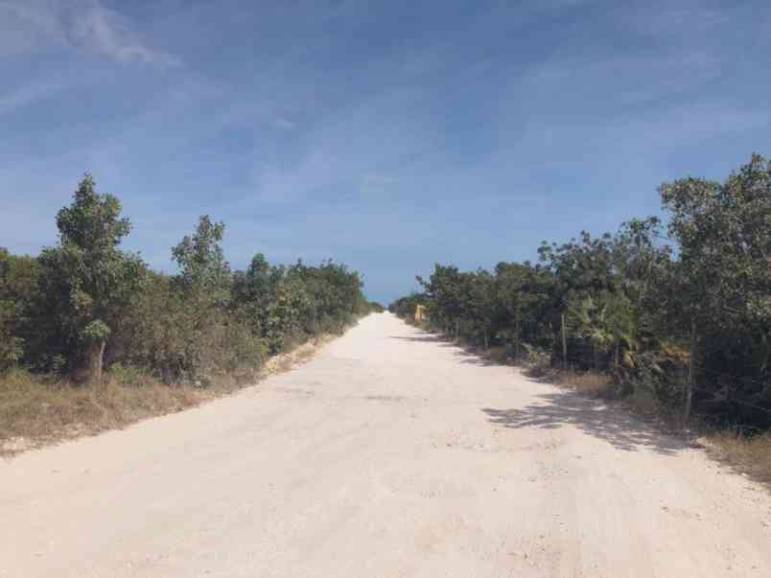
The first afternoon at the resort left me with feelings of bliss and millennial skepticism all at once. Dennis was ecstatic to see me. We had remained friends ever since he first came to America on foreign exchange from Ukraine nearly a decade ago in high school. I was thrilled to be celebrating his 25th birthday with him in Mexico, though he was more excited about the planned days ahead at Ikarus Kiteboarding School and I feigned the same level of eagerness so he wouldn’t be disappointed in me. The staff was nice, the pool was clean and the beaches were perfectly groomed with vendors trailing up and down selling quilts, jewelry, hats and cigars for whatever the tourists could give. It seemed that nearly half the resort’s tourists came down from Quebec and a few times I was able to maintain a conversation in French about the cold winters, life in New Hampshire vs. Canada, etc. The same type of mindless, drunken chatter spread through the pool, fueled by the sugary and watered-down drinks being served at the bar. I couldn’t immediately put my finger on it, but something about being at this place left me feeling strange…almost guilty. It wasn’t the age difference between myself and the rest of the tourists that left me feeling dumbstruck. But rather, the acknowledgment for the first time in my life at just how gluttonous and artificial the entire experience was.
All around me – on the beaches, at the lobby bar, in the pool – the same words were uttered:
“The service here is great! The locals really know how to treat Americans.”
“We come to the Isla Mujeres every year to sample a different 5-star hotel.”
“You have got to try the tacos from the lobby bar. You can’t beat the authentic food.”
Little did some of these people know that the food they were raving about was likely microwaved from a frozen package and that the service they boast about is a necessity: enforced by the hotel and vital for their own survival on the wages they earn. This wasn’t Mexico, but rather an annexed slice of America on the shores of a foreign land. But truthfully, who was I to judge? Just hours before, I faced dread at the thought of trying something real, something that many considered dangerous just for the inexplicable fact that my next destination lay situated outside the walls of the resort; outside the walls of “safety” and sameness.
Dawn broke the following morning around 7:15 a.m. and we awoke naturally from the orange light streaming through the room’s windows. I thought about the fact that nearly all 500 of the rooms at the resort complex likely shared the same red and green patterned couches and neo-contemporary designs within. A million boxes of the same boxy rooms containing guests that were waking to start the same day of indulgences and sloth. Why did I still so desperately want to join them? After a quick meal of fruit, sausage, croissants and coffee from the buffet, Dennis and I strolled down to the lobby to inquire about the shuttle’s potential to take us to Ikarus. To my greatest fear, the girl working at the lobby shook her head carelessly.
“Sorry but shuttles are only for transportation to and from the airport. You’ll have to walk.”
By this time, all hopes at hiding my fear for Dennis’s sake had gone out the window. He had no problem walking the mile on the road outside the gates, but I sure as hell wasn’t about to. Scenes from the “True Crime Garage” podcast flashed through my mind. I had already convinced myself that an episode featuring my missing body was underway. To come to a compromise, Dennis suggested we walk down the beach to calm my nerves. The stretch of beach ran parallel to the road, minus some vegetation. The front-desk girl assured us we would be able to cross the beach and hop on the main road when it came time to head down a sloping valley where we would find Ikarus. We set off in that direction wearing our sneakers, backpacks hats and shades with things we might need for the day. Some tourists stared us down as we appeared to be leaving the section with the resorts and off to a more isolated strip of land. I wondered how we must have stuck out suspiciously with our backpacks and shoes clinging as we walked the dunes.
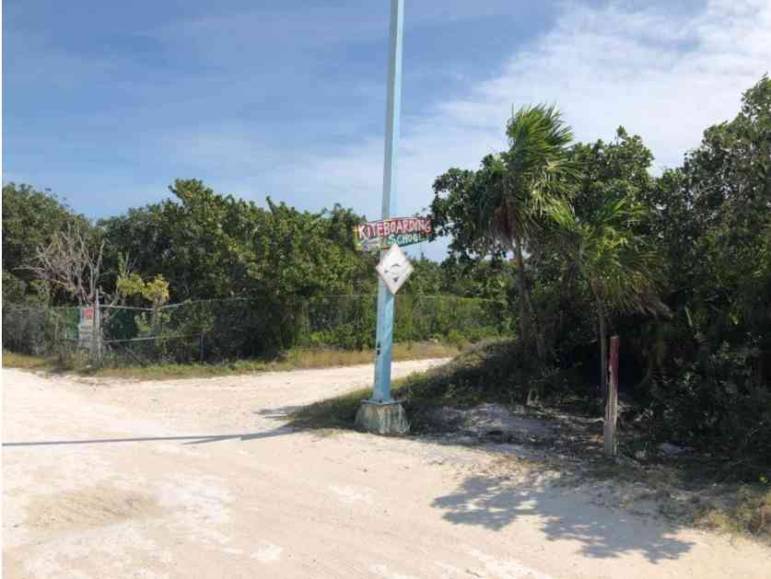
To my surprise (and to Dennis’s anger), the beach ended about a half a mile up, with the waves crashing close to a rocky formation along the vegetation. A chain-link fence that read “Private Property” every couple of meters blocked us from crossing the beach to the road. The only possibility to cross was with a tiny shack that looked nearly abandoned. Although, we both knew someone had to live there as smoke billowed out from the opposite side of the house by means of some yard fire or kitchen. A random assortment of plastic chairs, painted signs and objects were strewn around the property but we could see a clear way from beach to road along the side of the hovel. We slowly began walking through the yard as Dennis tried to make our presence known.
“Hola! Hello? Is anyone home? We are looking for the road to Ikarus,” Dennis shouted.
A man soon emerged in tattered clothing, but with a kind smile and ushered us along the side of his house to the front yard. By now we were fully out of the “safety zone” of the resort and wandering through a man’s yard in a foreign country. The man attempted to speak English but had to rely on mostly pointing as neither party fully understood the other’s language.
“Here, you see. Down the road. Is Ikarus. Straight.” The man continued to gesture down the dirt road in the direction we knew to be accurate. And with that, we set off down our one straight dirt path with the rays from the midday sun leaving traces on our already burnt skin.

Though our journey was only supposed to be a brief 1-1½ mile walk, my anxiety and fear over the unknown turned it into a marathon’s trek in my mind. Well outside of the gates of the resort, the dirt road was filled with muddy potholes, random strips of chain-link fence and overgrowth. A few abandoned or unfinished homes on the side of the road, but no signs of occupancy yet. A ways further, we passed a peculiar wall with square grooves and patterns along the top that resembled ancient-Minoan pottery. The wall was some form of plaster or concrete, stained with age and painted with imagery of tribal figures adorned in leopard skin, holding spears and offering bowls to a structure that resembled the nearby Chichen Itza. Likely a portrayal of the Mayan people of the pre-Columbian city. Of course, the mural couldn’t have been truly old, but it certainly wouldn’t have been erected for tourists this far off resort property and in the middle of nowhere.
Further on down the road we passed the first signs of an occupied residency. A large manor-style home with high gated walls and cameras stood with “private property” signs plastered in numerous areas. I skittered especially quickly past the walled driveway as a dirty pickup truck with men in the truck’s bed sped down the road, crashing over every bump and pothole in its way.
“Must be the cartel in that house,” Dennis said hauntingly, with a wink.
“Not funny” I remarked.
At last we approached a fork in the road with a bright, hand-painted sign that pointed toward Ikarus with simple red and blue lettering that resembled graffiti. “Kiteboarding School,” it read with an arrow. We were here.
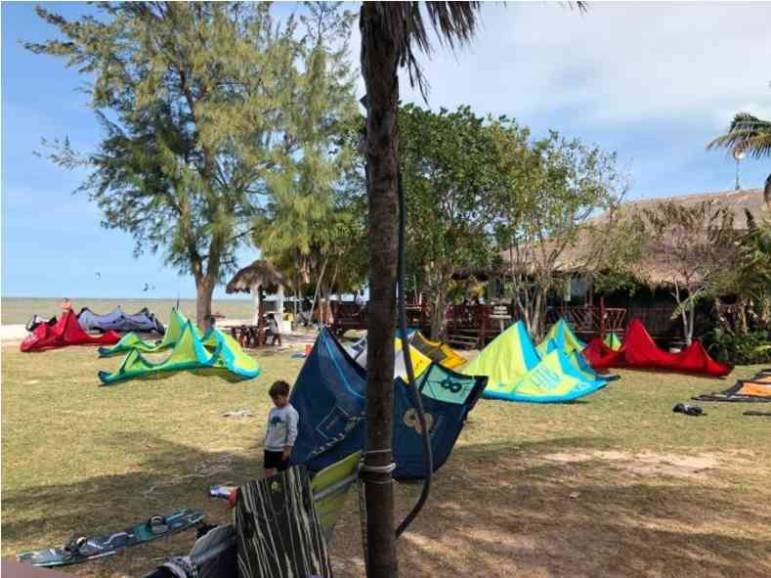
The entrance to Ikarus shared the same dusty unpaved road that we had followed for over a mile. Around the parameter of the Kiteboarding School was another chain-link Fence which designated a parking area for visitors and staff alike. The parking section was simply a grassy knoll crammed with SUVs, Volkswagens, hatchbacks and a handful of retro Kombis or “hippie vans” as they were commonly referred to. An abundance of palm trees surrounded the tiny complex which was made up of a white concrete building with several rooms for overnight guests, a small, open-air lobby and a café and deck in the fashion of a tropical tiki hut. Dennis and I entered the lobby to check-in, go through payment and the signing of the typical waivers. We were greeted by a lanky gentleman in baggy shorts and a sandy T-shirt. His skin was light but showed signs of a life lived under the sun; his hair long and straight, pulled back into a bun.
After conducting initial check-in, Dennis and I were each assigned an instructor. Dennis would be working with a man named Mowgli while I was assigned an instructor named Tim. Like the rest of the staff at Ikarus, each of the men were in impeccable shape with long, sandy hair and a calm, relaxed demeanor. The quintessential “surfer bro.” We came to learn that all of the staff lived onsite and came to Ikarus from various parts of the World: Australia, The Netherlands, South Africa. An old stained picnic table was set up with a few snacks where a male and female sat chatting and humming away the tunes of an unknown reggae artist. The male was sporting the same shaggy man-bun as the other instructors and was slowly took a hit from the glass bong placed in front of him. A skunky odor from marijuana and matches filled the air and the girl with few dreadlocks in her hair continued to strum her guitar. Tim was from Belgium and spoke a dialect of German as his first language. I was led to a wooden shed where the wetsuits were kept. I never was able to find one locally before my departure so a rental worked fine in any case.
“Now make sure to turn your wetsuit inside out before putting it on and really shake it out” Tim said.
“Oh, why do we need to do that?” I inquired.
“Scorpions, mate. These little buggers love to crawl up inside and make a home in here.”
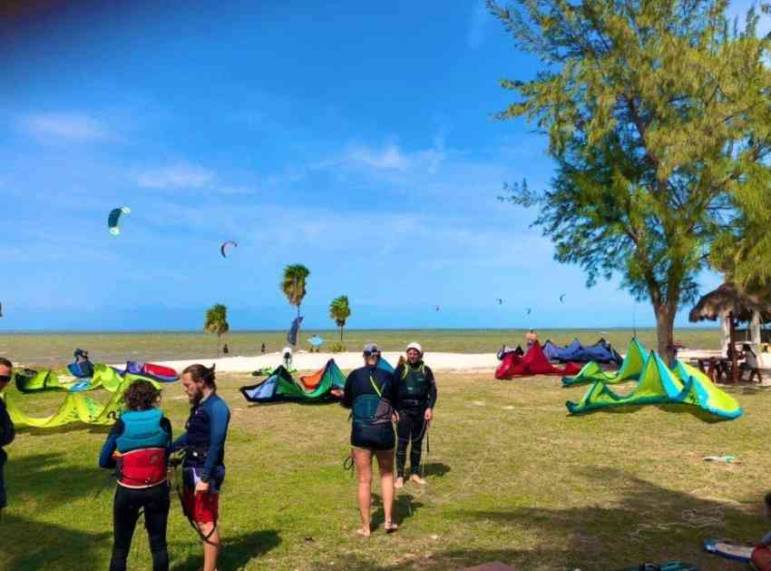
My face must have turned white, because Tim started to laugh as he saw my surprised expression. Coming from New Hampshire, I’ve dealt with moose crossings and bear sightings, but never scorpions. I carried my designated wetsuit to an outdoor wooden shower to change. I struggled for several minutes in my attempt to stretch the fabric over my body, which was by now, soaked in sweat. I stumbled out of the tiny outdoor shower with the wetsuit finally on, feeling nearly woozy from the heat beating down on the black fabric of the suit. I made my way to the edge of the beach where Ikarus touched the shores of a serene cove. Tim was making his way back to me and had set up the kite and harness on the grass for our training basics.
“Right, so here’s the deal. The right bar is red, and the left is blue. Pull down for more tension and altitude, let go for slack and the kite will come crashing back down to the waves. Once you’re connected to the harness and on the ocean, you’ll use your bars to direct the kite. But be careful; jerk the bar too fast one way or another and you’ll be launched into the air before you know it,” Tim explained.
Tim and I went through some trial moves, practicing the seated motion of the harness first with a tree in the yard. The kite itself could be compared to something closer to a parachute in size. I stared over the horizon onto the sea. The sky was clear and blue with the winds holding strong. A perfect first day to learn, according to Tim. The sky was filled with the soaring of kites of all patterns and colors. Below, the forms of the many surfers yielding their command through the waves, performing aerial feats with the boards attached at their feet. It was surreal to think I would soon be out there with them, either soaring through the waves or making a fool of myself (the ladder being more likely).
The sound of a water ski came humming to life. The operator of the machine instructed me to hop on the back as he was taking me further into the cove for my lesson. Tim would be following behind, making his way with via kite and surf that I would soon be using myself. The day was hot but the salty air and splashing of the waves provided relief in the form of mist as the Jet Ski soared further through the water to our final destination. As the operator slowed, I found that the water was between knee and thigh height even though we were far from shore. Tim’s figure came hurdling into sight as he yielded the kite and board effortlessly with the help of the wind.
Once I was fully harnessed to the kite, we began with some simple motion techniques as the kite lay still on the waters. With my knees slightly bent, I began to pull sharply down on the multi-colored bar to see the kite raise above me in the wind. Slowly providing slack to the bar and letting it lift up once more, the kite stood strong in the wind. Though I felt at any moment I could be plucked from the water or dragged through the waves against my will. Before Tim could instruct me too slowly try walking my kite to the right or the left, I accidentally jerked the bar rapidly to the right. Before I knew it, my feet were out of the water and I was being dragged through the waves, choking down the salty ocean tide. “Let go NOW!!” I heard Tim shouting from the distance. With a quick release of the bar, the kite came crashing back down to the waves and my choking on the waves came to a halt.
For the next hour, the pattern had replayed like Groundhog Day. Pull the bar, raise the kite, loosen the bar, walk the kite, move to quick, get dragged through the water. The concept of gliding through the waves seemed an eternity away when I couldn’t even “take my kite for a walk” as Tim had said. But suddenly, I had found just the right amount of slack as I was making my 34th attempt to avoid being dragged through the current. Not only had I lifted the kite and begun successfully moving it to both directions, but I had found that sweet spot on the bar that let me tread lightly through the waves even without the board attached at my feet. Just when I had thought Tim would surely give up on me, he smiled and slowly clapped his hands.
“There you go!” He praised. “And now, I think you’re ready for the board.”
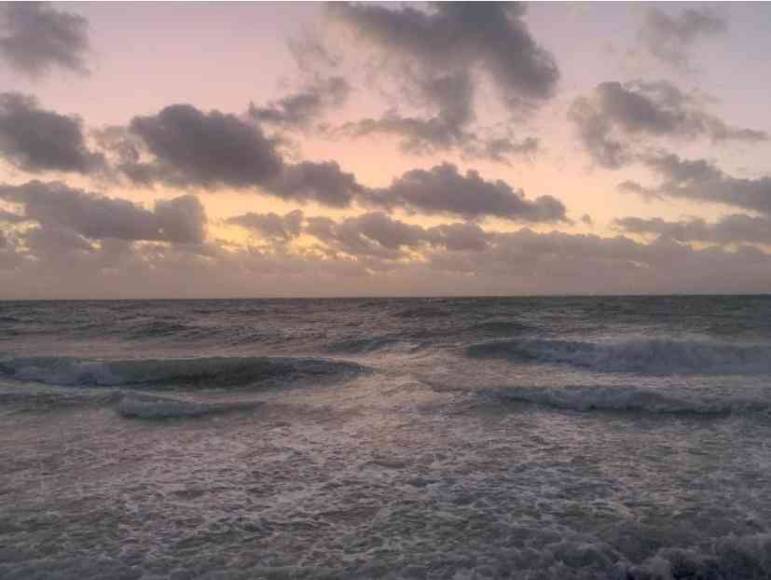
The board at my feet, I nervously repeated the steps I had taken nearly two hours to perfect. At first, my balance on the board in the waves was awkward and I came to a crash before even attempting to launch the kite.
“Focus, remember the techniques we discussed,” Tim said.
I closed my eyes and thought back to my lessons learning to ski down the slopes of Okemo on the snowy peaks of Vermont. “You can ski, so you can do this,” I thought to myself. A gust of wind came and with the release of the bar, an angled crouch on the board and a slow control of the levers, I was soaring through the waves, with the kite leading me along. But no, in fact, I was leading the kite. My speed enhanced and I curved sharply to the right with a ripple of water leaving my temporary mark on the ocean’s surface. The wind howled over my face with my eyes gleaming for my next turn through the water. In that moment, I didn’t think twice about the drunk tourists who were too scared to step a toe outside the artificial bubble of the Riu Dunamar. I was here and I was safe with some of the most interesting and kind people I had ever met. I wasn’t just alive, but I was living.

The midday sun was now heading closer to the West, signaling that it was time to return to the shores of the Isla Mujeres. My body was sore and I was still riding the high of exhilaration. Peeling off the wetsuit had left my body feeling liberated as I slipped into my shorts and tee. A larger RV was now parked near the other cars that I hadn’t noticed before. In the lobby, the American owners stood, exploring the site for the first time in wonder. The proud owners were none other than a middle-aged retired couple from Tucson, Arizona.
“We hit the open road just after Christmas with no end date in mind. We headed south of the border through Chihuahua, made our way past Durango and into Mexico City. After that, we came straight to Quintana Roo for the beaches and stopped in little towns along the way,” the woman explained.
“And you weren’t scared to be driving through central Mexico without any protection?” I implored.
“Hah,” she snickered. “I’d be more scared leaving my purse on a pool chair at one of those giant resorts we passed by. And besides, we have Flick.” The woman pointed to her medium-sized German shepherd, which was happily lapping up water from a bowl on the cement floor.
“We were only supposed to be in the Isla Mujeres for a few days, but it looks like my husband would gladly pitch a tent and stay forever if he could,” she continued.
So there were in fact people of all ages, genders and nationalities who had chosen to make the trek across borders, across oceans and outside the gates of confinement masked as a paradise. Some came temporarily, passing through or spending the night. Others came to start a new life, a simpler life to live out their passions for nothing more than the pursuit of happiness. As the sun now lowered in the sky, we began down the same dirt path road that few had walked and many would never see.
Alec Biron is a New Hampshire native, higher education professional and graduate student pursuing a master’s degree in writing.




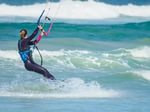
Recent Comments